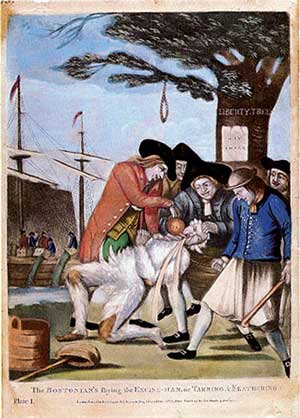 |
LITR 4231 Early American
Literature Research Posts 2014 (research post assignment) Research Post 1 |
 |
Thomas Dion
Loyalists are People Too

Does this picture look familiar? It does to me; it is a picture I saw
quite often in my history textbooks growing up, underneath the subheadings “Tar
and Feathering” or “Loyalist.” As with many kids, studying the revolution is
considered a Patriotic duty to be taken seriously, with respect, and
pride. Hence, the discussion of Loyalists and their reasons for staying loyal
was never brought forth in detail. (After all, it was American history and not
English history class). I remember my fifth grade teacher bringing the above
painting into focus one afternoon, pointing out how the Americans look devilish,
with snarling grins, carrying clubs, all while forcibly pouring hot tea down a
poor tarred-and-feathered man’s throat. At the time I thought this was nothing
more than propaganda, aimed at depicting the Americans negatively to gain
support at home, never did I think it was deserved criticism. The man’s name in
the painting is John Malcolm, and unlike the preconceived image I had of
Loyalists being King-loving-freedom-haters, he and like so many others, were
actually everyday people just like the rebellious revolutionaries, never
perfect, passionate, willing to
stand up for their beliefs, and at times, die for the ideals they believed in.
John Malcolm was not a loveable character to say the least, but should
that entail having hot tar torrentially covering his body? It seems a little
excessive to me, but I didn’t live back then. “The Worst Parade to Ever Hit the
Streets of Boston” by Nathaniel Philbrick tells the story leading up to this
fateful incident, revealing that John Malcolm was much more than just a customs
agent wanting the colonists to pay their taxes. Malcolm served as an officer in
the French and Indian war and thought of himself very highly in doing so,
claiming to have had two horses shot out from underneath of him and writing to
the King, “‘none could go further in the field of battle when the bullets flew
thickest, he was then in his element’” (Philbrick 1). The similarities to George
Washington’s military career in the French and Indian war should go to show that
at one time, even the founding fathers were Loyalists.
As with many Loyalists, Malcolm, took his allegiance seriously which made
him unpopular with the colonists. After a “genteel” tarring and feathering—when
the vigilantes allowed the victim to keep his clothes on—in the fall of 1774,
Malcolm had a reputation for being a stickler for the tax code. An unpopular
political stance with the rebel colonists, facing economic ruin, if their
smuggling business were to cease operation, that is to say, goes legitimate.
This tension culminated on January 25, 1774 when Malcolm lost his temper with a
careless sledding boy, then hit a man with his cane who tried to intervene, then
was dragged out of his house and subsequently dragged through the streets of
Boston (Philbrick 1-3). This time he did not get to keep his jacket on. Whether
or not tax collectors are revered or not, they do serve a purpose and John
Malcolm was just a man trying to do his job. This notion of performing one’s
duty to country is also positioned by Thomas Allen in his book Tories:
Fighting for the King in America’s First Civil War. According to his
research, John Adams, in his own accounts estimates one third of the colonies'
population consisted of Loyalists, which means there was a large group of people
facing persecution if what was to happen to Malcolm reoccurred to others—just
doing their job (6, 154). Not all Loyalists chose to stay devoted to the crown
for monetary reasons; some continued for a theological purpose.
One of the doctrines of the Anglican Church is that the Head of England
is the Head of the Church. In “For God, King, and Country: Loyalism on the
Eastern Shore of Maryland during the American Revolution,” Barry Neville,
explores this component of religious freedom brought under attack by the
revolutionaries. If one of your core religious beliefs is to support the King,
then what happens when the political ties which connect the two are forcibly
severed? As Neville observes, “Attempts to interfere with freedom of worship
leads to a retrenchment in beliefs of the group under attack” (Neville 141).
Which meant the more the Anglicans were pushed into supporting the war, the more
they pushed back in unceasing loyalty to the sovereign dogma of the Anglican
Church (Neville 142). Say what you want to about taxes, if you are an ordinary
church member who has come to the colonies under the protection of the King in
connection with the church, why would you leave it in favor of those to abandon
your faith? Most Loyalists refused this notion, either returning back to England
or remaining as a pacifist observer. As such, those who stayed endured strict
regulations from the state governments requiring sermons and speeches to concern
only theological issues and not political issues (Neville 142). Although they
did not join in arms, these individuals helped their fellow Loyalist citizens by
providing medical aid to soldiers after battle (Neville 143). The Anglicans were
not the only social group to be alienated by the Patriot rebels into making the
decision to stay Loyal easier; there was another group, the American slaves,
whose recognition of themselves as striving for their own independence separate
from the colonists was in its infancy.
The slaves owned by both the Americans and British wanted their freedom
as well. These were the individuals who were truly being taxed without
representation. It was extremely surprising to myself when I found out through,
http://blackloyalist.com/canadiandigitalcollection/,
that the first emancipation of slaves, was not performed by Abraham Lincoln, but
in fact was issued by Lord Dunmore, Royal Governor of Virginia, in 1775. The
Proclamation was for any able bodied man to answer his call to arms, as he was
held up at Norfolk fending off a group of Patriots. The Proclamation stated that
any man joining the King’s army would be granted their freedom; countering this
was the Virginia Congress, who decreed it as “'striking against the foundations’
of Virginia’s society.” Within a month Dunmore had raised over eight hundred
troops; however, the honeymoon would be short-lived. Some of the slaves who
escaped were later returned under fugitive slave laws by Patriot and Loyalist
alike. Furthermore, after the war had ended, a majority of the escaped slaves
who had fought as soldiers were sold back into slavery in the Americas or
Caribbean sugar plantations. A small minority were able to relocate in Canada
but still received harsh racial treatment from fellow Loyalists. The turning
point came when a Black veteran from the war, Thomas Peters, began a movement
leading to the foundation of Sierra Leone and later Liberia. Each of these
countries was founded in order for escaped slave Loyalists to migrate back to
some kind of homeland, escaping racial bigotry in America in hopes of finding
their freedom.
A time of rebellion and dissent are hardly predictable and looking back,
from my station in time, affords many advantages. I now see that the American
Revolution was more than a war for freedom from an overbearing tyrant. It was a
culmination of events that included many people with justifiable reasons to
support their freedom from an overbearing mob mentality. Either way it was the
people who were involved, not just the governments—people who disagreed and
often times came out sounding hypocritical. Something can be learned from this
in today’s world as we try and push our beliefs of governance on the rest of the
world. That lesson is to simply listen to the other side; the more this occurs
the more bridges of understanding we build, instead of burning them with
inflammatory remarks. Patriot, Loyalist, Rebel, Tory: these are terms with
values imposed from without, used to separate and isolate, for examination or
discriminatory purposes. The suffering of these Loyalists has brought home to me
that war is hell, and can turn neighbors, friends, and family against one
another. Although I am now a member of the winning side of that conflict, I can
see the value in the ideals those individuals stood for, which is not at all
different from my own ideals, revealing to me that countries are but arbitrary
lines on a map, people are people, and we are all in this together.
Works Cited
Allen, Thomas B. Tories: Fighting for the King in America’s First Civil War.
NY: HarperCollins, 2010. Print.
Canada’s Digital Collection. Black Loyalist: Our History, Our People.
Industry Canada.
Dawe, Philip. The Bostonians Paying the Excise-man, or Tarring and Feathering.
1774, London. United States Library of Congress Prints and Photographs. Web. 25
Mar. 2014.
Neville, Barry Paige. "For God, King, And Country: Loyalism On The Eastern Shore
Of Maryland During The American Revolution." International Social Science
Review 84.3/4 (2009): 135-156. Academic Search Complete. Web. 23 Mar.
2014.
Philbrick, Nathaniel. “The Worst Parade to Ever Hit the Streets of Boston.”
Smithsonianmag.com.
Smithsonian Institution, 1 April 2013. Web. 22 Mar. 2014.
|
|
|
|


